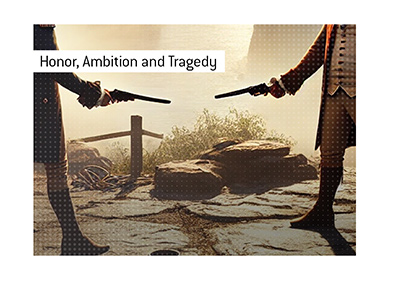The Story of the Duel Between Alexander Hamilton and Aaron Burr
 In the annals of American history, few events capture the imagination quite like the duel between Aaron Burr and Alexander Hamilton. This wasn't just any duel; it was a clash of titans, a moment where personal animosity and political rivalry culminated in one of the most dramatic and tragic events in early American politics.
In the annals of American history, few events capture the imagination quite like the duel between Aaron Burr and Alexander Hamilton. This wasn't just any duel; it was a clash of titans, a moment where personal animosity and political rivalry culminated in one of the most dramatic and tragic events in early American politics.The Background:
Alexander Hamilton, a key figure in the founding of the United States, was known for his sharp intellect, fiery rhetoric, and, unfortunately, his penchant for making enemies. Aaron Burr, on the other hand, was a man of considerable political ambition, serving as the third Vice President of the United States under Thomas Jefferson. Their relationship was fraught with competition, mistrust, and eventually, outright hostility.
The Build-Up:
The immediate cause of the duel was a letter published in the Albany Register. Charles D. Cooper had written that at a dinner, Hamilton had called Burr "a dangerous man" and someone who ought to be "shunned" by "honorable men." This was the straw that broke the camel's back. Burr, feeling his honor impugned, demanded an apology or satisfaction. Hamilton, ever the man of honor, could not back down from such a challenge.
The Duel:
On July 11, 1804, at Weehawken, New Jersey, across the Hudson River from New York City, the two men met for their fateful encounter. The site was infamous; it was where Hamilton's son, Philip, had been killed in a duel three years earlier.
The Weapons: Both men used pistols, with Hamilton choosing a set known for their inaccuracy, perhaps indicating his reluctance for bloodshed.
The Rules: They stood ten paces apart, with the option to fire at will after the word "Present" was given.
The Outcome:
What happened next has been debated by historians. Some believe Hamilton fired into the air, a gesture to signify he would not kill Burr, while others argue he might have aimed at Burr but missed. Burr, however, did not miss. Hamilton was struck in the abdomen, and the bullet lodged in his spine. He was mortally wounded.
The Aftermath:
Hamilton died the next day, leaving behind a legacy of brilliance but also a reminder of the dangers of personal vendettas. Burr, though legally cleared of murder, saw his political career effectively ended. He was never again trusted in the same way, and his vice presidency ended in 1805.
Reflections:
This duel wasn't just about personal honor; it was a microcosm of the political and social tensions of the time. Here was a Vice President, a heartbeat away from the presidency, engaging in what was essentially a legal form of murder. The event underscores the volatility of the era, where personal honor could lead to such drastic measures.
Legacy: Hamilton's death only increased his posthumous fame, making him an almost mythical figure in American lore. Burr, conversely, became a cautionary tale of ambition unchecked by moral considerations.
Modern Interpretations: Today, this event is often romanticized, especially through musicals like "Hamilton," which dramatizes their relationship. However, it's crucial to remember the real human cost and the political ramifications that followed.
The duel between Burr and Hamilton remains one of those pivotal moments in history where personal and political lives collided with tragic results, reminding us of the complex nature of human ambition, honor, and the cost of conflict.
Filed under: General Knowledge



